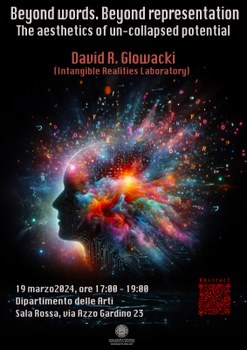Language dominates cognition, yet falls short of capturing complex experiences. David R. Glowacki explores theories beyond words, using interdisciplinary approaches and VR research to understand ineffable aspects of consciousness within a limited framework.
Data: 19 MARZO 2024 dalle 17:00 alle 19:00
Luogo: Sala Rossa, Via Azzo Gardino 23, Bologna

Organizzato da: Filippo Ferrari, Sebastiano Moruzzi, Chiara Tartarini
In collaborazione con: Emanuele Paci
Con: David R. Glowacki (Intangible Realities Laboratory (IRL)Citius Intelligent Technologies Research Centre, Santiago de Compostela, Spain)
As human cognition increasingly succumbs to the deluge of language, from endless news to AI's reliance on words for representation, we find ourselves in a world where expression trumps thought. Yet, language's simplicity fails to capture the complexity of human experience, much like dark matter remains beyond direct observation. In my talk, I merge concepts from various fields to explore beyond linguistic confines, advocating for a framework that embraces the unquantifiable and ineffable. Through examples and virtual reality studies, I aim to illustrate the profound impact of transcending linguistic barriers on understanding consciousness.
Despite its power, language is relatively low-dimensional format for representing multisensory experience: the rich and varied phenomenology which characterizes nuanced forms of experience and expression cannot be easily collapsed into words. Indeed, recent neuroscience research has highlighted the value of experiences which are ‘ineffable’ – i.e., which defy straightforward linguistic classification. Cognition beyond the linguistic, which cannot be easily catalogued, organized, or stored, in some sense plays a role similar to that of ‘dark matter’ or ‘quantum superposition’ in physics: essences which are nearly impossible to observe or represent, but which are crucial for describing nature.
In this talk, I will weave together ideas from a range of disciplines, including predictive coding and entropy-based models of cognition, matter-energy concepts in physics, along with psychedelic & near-death phenomenology. I will elaborate a theoretical framework for ‘un-collapsed’ forms of representation which aim to go beyond day-to-day phenomenology and transcend detailed linguistic classification. I will outline some practical examples of ‘un-collapsed’ approaches to representation, and describe some recent empirical studies using virtual reality to investigate the impacts which such aesthetic approaches appear to have on experimental participants.